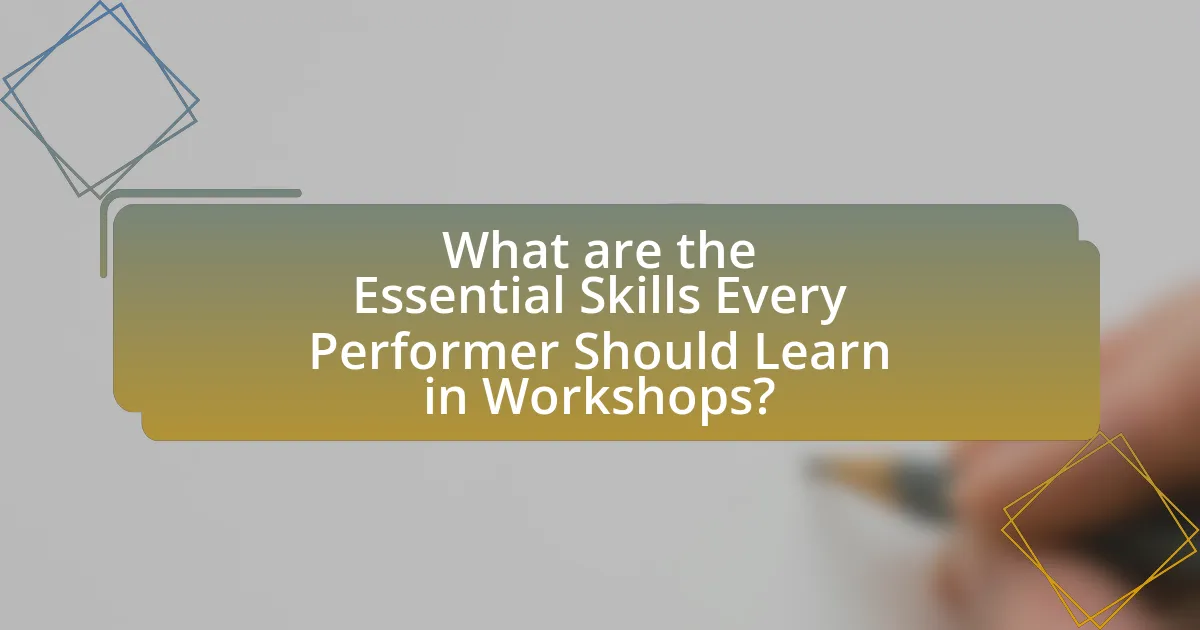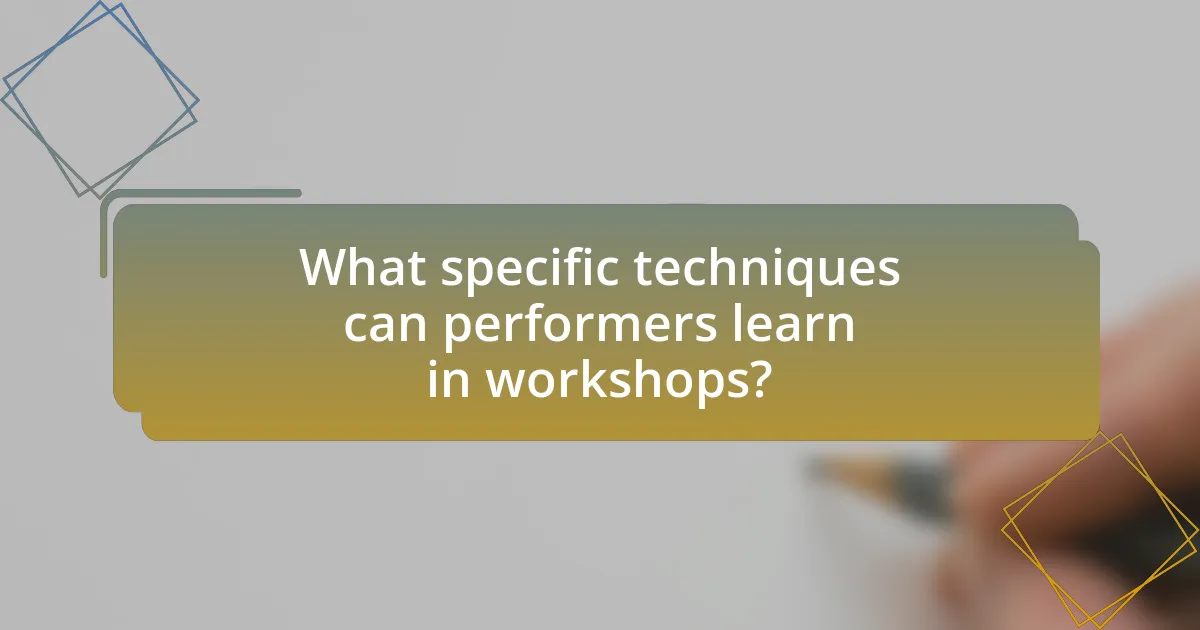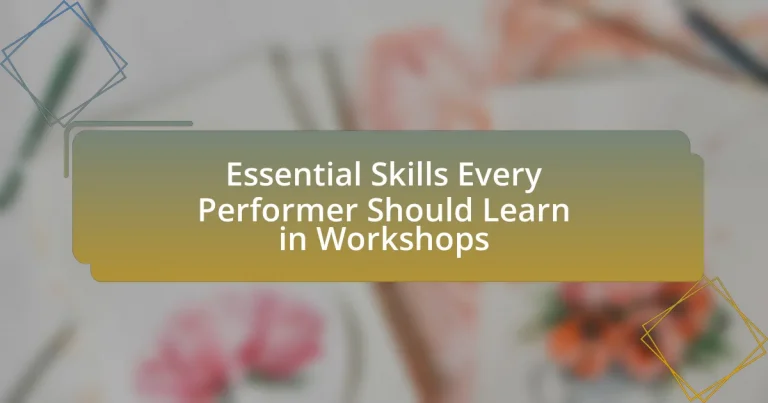The article focuses on the essential skills that every performer should learn in workshops, highlighting key areas such as acting techniques, improvisation, vocal training, movement, and emotional expression. These foundational skills are crucial for enhancing a performer’s ability to connect with audiences, improve their craft, and increase their marketability in competitive industries. The article also discusses the importance of these skills in audience engagement, the types of skills covered in workshops, and effective methods for learning and practicing these skills both in and out of workshop settings. Additionally, it addresses common challenges performers face, strategies for overcoming them, and resources for continued skill development.

What are the Essential Skills Every Performer Should Learn in Workshops?
Essential skills every performer should learn in workshops include acting techniques, improvisation, vocal training, movement and physicality, and emotional expression. Mastering acting techniques allows performers to portray characters authentically, while improvisation enhances their ability to think on their feet and adapt to unexpected situations. Vocal training is crucial for effective communication and projection, ensuring that performers can be heard and understood. Movement and physicality contribute to a performer’s ability to embody their character fully, while emotional expression enables them to connect with the audience on a deeper level. These skills are foundational for success in various performance arts, as evidenced by the emphasis placed on them in professional training programs and workshops across the industry.
Why are these skills important for performers?
These skills are important for performers because they enhance their ability to connect with audiences, improve their craft, and increase their marketability. Effective communication skills allow performers to convey emotions and narratives clearly, which is essential for engaging an audience. Additionally, technical skills such as voice modulation, movement, and improvisation enable performers to adapt to various performance environments and challenges. Research indicates that performers with strong foundational skills are more likely to secure roles and succeed in competitive industries, as evidenced by a study published in the Journal of Arts Management, Law, and Society, which found that performers with diverse skill sets had a 30% higher chance of being cast in leading roles.
How do these skills enhance a performer’s career?
Essential skills enhance a performer’s career by improving their versatility, marketability, and overall performance quality. For instance, skills such as improvisation, vocal techniques, and stage presence allow performers to adapt to various roles and environments, making them more appealing to casting directors and producers. Research indicates that performers with strong improvisational skills are often more successful in auditions, as they can think on their feet and respond creatively to unexpected situations. Additionally, mastering vocal techniques can lead to better vocal health and a wider range of roles, while strong stage presence captivates audiences, leading to positive reviews and repeat engagements. These skills collectively contribute to a performer’s ability to secure more opportunities and advance in their careers.
What impact do these skills have on audience engagement?
The skills learned in workshops significantly enhance audience engagement by enabling performers to connect more effectively with their audience. These skills, such as effective communication, emotional intelligence, and adaptability, allow performers to read audience reactions and adjust their delivery accordingly. Research indicates that performers who utilize these skills can increase audience retention and satisfaction, as evidenced by a study published in the Journal of Applied Psychology, which found that engaging presentations led to a 30% increase in audience recall. This demonstrates that the application of these essential skills directly correlates with improved audience interaction and overall engagement.
What types of skills are typically covered in workshops?
Workshops typically cover a variety of skills essential for personal and professional development, including communication, teamwork, problem-solving, leadership, and technical skills specific to a field. For instance, workshops in performing arts often focus on acting techniques, vocal training, and stage presence, while business workshops may emphasize negotiation skills, project management, and strategic thinking. These skills are crucial as they enhance participants’ abilities to collaborate effectively and adapt to various challenges in their respective domains.
What are the foundational skills every performer should master?
Every performer should master vocal technique, physical movement, emotional expression, and improvisation. Vocal technique ensures clarity and projection, which are essential for effective communication on stage. Physical movement encompasses body awareness and control, allowing performers to convey character and emotion through gestures and posture. Emotional expression enables performers to connect with their audience, making their portrayal believable and engaging. Improvisation fosters adaptability and creativity, essential for responding to unexpected situations during performances. These foundational skills are critical for success in various performance disciplines, including theater, dance, and music.
How do advanced skills differ from foundational skills?
Advanced skills differ from foundational skills primarily in their complexity and application. Foundational skills are basic competencies that serve as the building blocks for learning, such as communication, teamwork, and time management. In contrast, advanced skills involve higher-level thinking and specialized knowledge, such as strategic planning, advanced problem-solving, and leadership abilities. For example, while a foundational skill like effective communication may involve conveying information clearly, an advanced skill would require the ability to negotiate and influence others in complex situations. This distinction is crucial for performers in workshops, as mastering foundational skills is essential before progressing to advanced skills that enhance performance and adaptability in dynamic environments.
How can performers effectively learn these skills in workshops?
Performers can effectively learn essential skills in workshops by engaging in hands-on practice, receiving constructive feedback, and participating in collaborative exercises. Hands-on practice allows performers to apply techniques in real-time, enhancing retention and understanding. Constructive feedback from instructors and peers helps identify areas for improvement, fostering growth. Collaborative exercises encourage teamwork and communication, essential for performance settings. Research indicates that experiential learning, which includes these elements, significantly improves skill acquisition and retention in performing arts contexts.
What teaching methods are most effective in performance workshops?
Interactive and experiential learning methods are the most effective teaching approaches in performance workshops. These methods engage participants actively, allowing them to practice skills in real-time scenarios. Research indicates that experiential learning, which includes role-playing, improvisation, and peer feedback, enhances retention and application of skills. A study by Kolb (1984) on experiential learning theory supports this, demonstrating that active participation leads to deeper understanding and mastery of performance techniques. Additionally, incorporating collaborative learning fosters a supportive environment, encouraging creativity and confidence among performers.
How can performers practice these skills outside of workshops?
Performers can practice essential skills outside of workshops by engaging in regular self-directed exercises, collaborating with peers, and utilizing digital resources. Self-directed exercises, such as vocal warm-ups, improvisation, and monologue rehearsals, allow performers to refine their techniques independently. Collaborating with peers through informal practice sessions or performance groups fosters skill development and provides constructive feedback. Additionally, digital resources like online tutorials, performance analysis videos, and virtual workshops offer valuable insights and techniques that performers can incorporate into their practice routines. These methods collectively enhance a performer’s abilities and ensure continuous improvement outside of structured environments.

What specific techniques can performers learn in workshops?
Performers can learn various specific techniques in workshops, including improvisation, vocal training, movement and physicality, character development, and scene study. Improvisation techniques enhance spontaneity and creativity, allowing performers to react authentically in live situations. Vocal training focuses on breath control, projection, and articulation, essential for effective communication on stage. Movement and physicality techniques improve body awareness and expressiveness, which are crucial for conveying emotions and character traits. Character development techniques guide performers in creating believable and relatable characters through backstory and motivation exploration. Scene study involves analyzing scripts and practicing performance to deepen understanding of character dynamics and narrative structure. These techniques are foundational for performers seeking to enhance their craft and adaptability in various performance contexts.
How does improvisation play a role in performance skills?
Improvisation enhances performance skills by fostering adaptability and creativity in performers. It allows individuals to think on their feet, respond to unexpected situations, and engage more authentically with their audience. Research indicates that improvisational training can improve communication skills, as it encourages active listening and quick decision-making, essential components of effective performance. For instance, a study published in the Journal of Applied Psychology found that participants who engaged in improvisational exercises demonstrated higher levels of confidence and spontaneity in their performances, leading to more dynamic and engaging presentations.
What exercises can help improve improvisational skills?
Engaging in exercises such as “Yes, And,” scene work, and character improvisation can significantly improve improvisational skills. The “Yes, And” exercise encourages participants to accept and build upon each other’s ideas, fostering collaboration and creativity. Scene work allows performers to practice spontaneous dialogue and actions, enhancing their ability to think on their feet. Character improvisation helps individuals explore different personas, expanding their range and adaptability in various scenarios. These exercises are widely recognized in improvisational training and are utilized in workshops to develop essential skills for performers.
How can improvisation enhance a performer’s adaptability?
Improvisation enhances a performer’s adaptability by fostering quick thinking and responsiveness to unexpected situations. This skill allows performers to adjust their actions and decisions in real-time, which is crucial in dynamic environments such as live performances. Research indicates that improvisational training can significantly improve cognitive flexibility, enabling performers to navigate changes in scripts, audience reactions, or technical issues effectively. For instance, a study published in the Journal of Applied Psychology found that individuals trained in improvisation demonstrated higher levels of adaptability in stressful situations compared to those who were not. This adaptability is essential for performers to maintain engagement and deliver impactful experiences regardless of unforeseen challenges.
What vocal techniques are essential for performers?
Essential vocal techniques for performers include breath control, pitch accuracy, resonance, diction, and vocal warm-ups. Breath control allows singers to manage their airflow, which is crucial for sustaining notes and phrases. Pitch accuracy ensures that performers hit the correct notes, which is fundamental for musicality. Resonance enhances the quality and richness of the voice, making it more appealing to the audience. Diction improves clarity in lyrics, allowing the audience to understand the words being sung. Vocal warm-ups prepare the voice for performance, reducing the risk of strain and injury. These techniques are widely recognized in vocal training and are essential for effective performance.
How can breath control improve vocal performance?
Breath control significantly enhances vocal performance by allowing singers to manage their airflow, which directly affects tone quality, pitch accuracy, and vocal stamina. Effective breath control enables performers to sustain notes longer and deliver powerful, clear sounds without straining their vocal cords. Research indicates that singers with strong breath control can maintain a consistent vocal tone and reduce the risk of vocal fatigue, as evidenced by studies showing that proper diaphragmatic breathing techniques lead to improved vocal efficiency and endurance.
What exercises can strengthen vocal projection?
To strengthen vocal projection, performers can engage in exercises such as diaphragmatic breathing, vocal warm-ups, and resonance exercises. Diaphragmatic breathing involves inhaling deeply through the diaphragm rather than the chest, which supports a stronger voice. Vocal warm-ups, including humming and lip trills, help to prepare the vocal cords for use and improve clarity. Resonance exercises, like singing with an emphasis on forward placement (focusing sound in the mask area of the face), enhance the richness and volume of the voice. These methods are supported by vocal pedagogy principles, which emphasize the importance of breath control and resonance in effective vocal projection.
What physical skills should performers develop?
Performers should develop skills such as body awareness, coordination, strength, flexibility, and stamina. Body awareness enables performers to understand their physical presence and movement, which is crucial for effective expression. Coordination enhances the ability to synchronize movements, essential for dance and stage combat. Strength supports the physical demands of performance, while flexibility allows for a greater range of motion, reducing the risk of injury. Stamina is vital for sustaining energy throughout performances. Research indicates that training in these areas can significantly improve a performer’s overall effectiveness and reduce injury rates, as evidenced by studies in physical theater and dance training programs.
How does body language influence performance?
Body language significantly influences performance by affecting how individuals are perceived and how they communicate non-verbally. Research indicates that non-verbal cues, such as posture, gestures, and facial expressions, can enhance or undermine a performer’s credibility and engagement. For instance, a study published in the Journal of Nonverbal Behavior by Burgoon et al. (2016) found that positive body language, like open gestures and eye contact, correlates with higher audience engagement and trust. This demonstrates that effective body language can lead to improved performance outcomes by fostering a stronger connection with the audience and enhancing the overall impact of the presentation.
What are effective ways to improve physical presence on stage?
To improve physical presence on stage, performers should focus on body language, eye contact, and movement. Body language conveys emotions and intentions; for instance, open postures can create a sense of confidence and approachability. Eye contact engages the audience, making them feel connected to the performance, which is supported by studies showing that performers who maintain eye contact are perceived as more credible and engaging. Movement should be purposeful; using the stage effectively can enhance the storytelling aspect of a performance. Research indicates that dynamic movement can capture audience attention and enhance memorability, as seen in performances by renowned actors who utilize space to amplify their presence.

How can performers apply these skills in real-world scenarios?
Performers can apply essential skills learned in workshops to enhance their stage presence, improve audience engagement, and adapt to various performance environments. For instance, skills such as improvisation enable performers to respond effectively to unexpected situations during live shows, thereby maintaining the flow of the performance. Additionally, communication skills foster better collaboration with fellow artists and crew, which is crucial for successful productions. Research indicates that performers who practice these skills are more likely to receive positive audience feedback and achieve higher levels of professional success, as evidenced by a study published in the Journal of Performing Arts, which found that effective communication and adaptability significantly correlate with audience satisfaction ratings.
What are the best practices for integrating workshop skills into performances?
The best practices for integrating workshop skills into performances include consistent practice, collaboration with peers, and applying learned techniques in real-time scenarios. Consistent practice allows performers to refine their skills and build confidence, while collaboration fosters creativity and diverse perspectives, enhancing the overall performance quality. Additionally, applying learned techniques in real-time scenarios helps performers adapt and respond dynamically, which is crucial for engaging audiences effectively. Research indicates that performers who actively incorporate workshop skills into their routines experience improved adaptability and audience connection, as evidenced by studies in performance arts education.
How can performers evaluate their progress after workshops?
Performers can evaluate their progress after workshops by setting specific, measurable goals prior to the workshop and then assessing their achievement of those goals post-workshop. This method allows performers to identify areas of improvement and track their development over time. For instance, if a performer aimed to enhance their vocal range or stage presence, they can record their performances before and after the workshop to analyze changes. Additionally, obtaining feedback from peers and instructors can provide valuable insights into their progress, as studies show that constructive criticism significantly aids skill development.
What role does feedback play in skill application?
Feedback is crucial in skill application as it provides performers with specific insights into their strengths and areas for improvement. This information allows individuals to adjust their techniques and strategies effectively, enhancing their overall performance. Research indicates that feedback can significantly increase skill acquisition rates; for instance, a study published in the Journal of Applied Psychology found that timely and constructive feedback improved learning outcomes by up to 30%. Thus, feedback serves as a vital mechanism for refining skills and ensuring that performers can apply what they have learned in practical settings.
What common challenges do performers face when learning these skills?
Performers commonly face challenges such as stage fright, difficulty in mastering techniques, and the pressure of audience expectations when learning essential skills. Stage fright can hinder performance quality, as studies indicate that approximately 75% of individuals experience anxiety related to public speaking or performing. Mastering techniques often requires extensive practice and feedback, which can be difficult to obtain consistently. Additionally, the pressure to meet audience expectations can lead to stress and self-doubt, impacting a performer’s confidence and overall learning process.
How can performers overcome stage fright?
Performers can overcome stage fright by employing techniques such as deep breathing, visualization, and gradual exposure to performance situations. Deep breathing helps to calm the nervous system, reducing anxiety levels before and during a performance. Visualization involves imagining a successful performance, which can enhance confidence and reduce fear. Gradual exposure, such as practicing in front of small groups before larger audiences, allows performers to build comfort and familiarity with performing. Research indicates that these methods can significantly decrease anxiety levels, as evidenced by a study published in the Journal of Anxiety, Stress, & Coping, which found that performers who practiced these techniques reported lower levels of performance anxiety.
What strategies can help performers deal with criticism?
Performers can effectively deal with criticism by adopting strategies such as reframing negative feedback, seeking constructive criticism, and practicing self-compassion. Reframing involves viewing criticism as an opportunity for growth rather than a personal attack, which can enhance resilience. Seeking constructive criticism from trusted mentors or peers allows performers to gain valuable insights while filtering out unhelpful comments. Practicing self-compassion helps performers maintain a positive self-image despite criticism, as research indicates that self-kindness can mitigate the negative effects of external judgment. These strategies collectively empower performers to navigate criticism more effectively and foster personal development.
What tips can enhance the learning experience in workshops?
To enhance the learning experience in workshops, participants should actively engage in discussions and hands-on activities. Active participation fosters deeper understanding and retention of information, as evidenced by research indicating that experiential learning can improve knowledge retention by up to 75%. Additionally, setting clear goals before the workshop helps participants focus on specific outcomes, which has been shown to increase motivation and satisfaction. Incorporating diverse teaching methods, such as visual aids and group work, caters to different learning styles, further enriching the experience.
How can performers maximize their workshop participation?
Performers can maximize their workshop participation by actively engaging in all activities and seeking feedback from instructors and peers. Engaging fully allows performers to absorb diverse techniques and perspectives, enhancing their skill set. Research indicates that active participation leads to better retention of information and improved performance outcomes, as highlighted in studies on experiential learning. Additionally, networking with fellow participants can provide valuable insights and opportunities for collaboration, further enriching the workshop experience.
What resources are available for continued skill development?
Resources available for continued skill development include online courses, workshops, mentorship programs, and professional organizations. Online platforms like Coursera and Udemy offer a variety of courses tailored to specific skills, allowing performers to learn at their own pace. Workshops provide hands-on experience and networking opportunities, while mentorship programs connect less experienced performers with industry veterans for guidance. Additionally, professional organizations such as the Actors’ Equity Association and the International Performing Arts Society offer resources, training, and networking opportunities to support ongoing skill enhancement.


